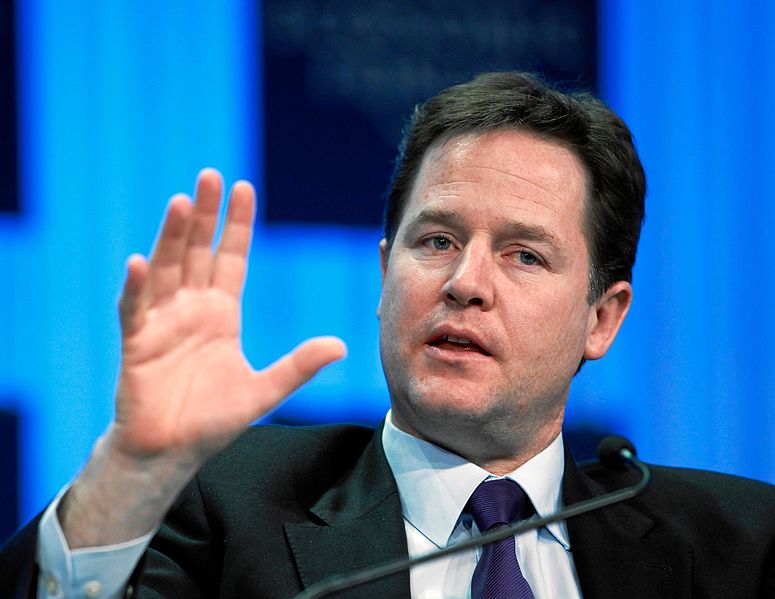Irish voters saved senators’ chairs. Doubts in the IMF. Brussels watches over vacuum cleaners.
Big cars are said to be confidence enhancers. Is this theory applicable to the big Europe? Nick Clegg, leader of the British liberals, said in a speech that Britain wouldn’t be taken seriously by Americans and the Chinese if it had quit the EU. I’m not sure what ‘to be taken seriously’ means. For Norway, a little non-member country, it means being asked by Americans and Russians to help destroy Syria’s chemical weapons.
European foreign policy is sometimes really successful. Recently, it has won a battle against Russia for a new ‘gas’ ally – Azerbaijan. The country’s current progress is striking, sometimes even shocking. For example, they publish election results before the polls even open! I believe European diplomats will make it clear that our new ally is a true follower of democratic and European principles.
Nick Clegg opposes the EU withdrawal referendum, which his stronger coalition partner, David Cameron (grudgingly) supports. However, a referendum may surprise sometimes. The Irish one, to the surprise of virtually everyone, has just rejected a government proposal to abolish the upper house of the parliament. An Irish voter suspects a scam when he is told that the deputies have decided to abolish half of their offices. Therefore, all the senators stay at work, but they will have to save the planned 20 million euros on something else.
Money was the Commission’s hot topic. The commissioner in charge of regional aid, Johannes Hahn, said that ‘billions of euros of EU taxpayers’ money were in the past spent with no clear strategy or benchmarks.’ He promised to set new conditions and targets to measure results in the next financial framework. It’s a pity that nobody in Brussels has noticed it for several years. We will see how long it takes to change it.
Some interesting documents have leaked from the IMF. According to the documents, there was not too much optimism about the Greek crisis scenario among the members in 2010, which contradicts the fund’s public statements. One third of the non-European members strongly objected to the bailout of Greece. Argentinians claimed that the whole rescue plan only postponed the unavoidable Greek default. The default really happened two years after that. Well, Argentina knows something about defaults. The official predictions of the IMF are usually very optimistic in general. ZeroHedge has made an over-time revision of IMF’s last 8 growth forecasts and found out that the reality was much worse. But it’s nothing special. The Commission employs similarly optimistic (and well-paid) fortune-tellers.
Predictions for Greece are still pessimistic. The possibility of reaching a primary surplus looks like the legendary El Dorado for many people. There is more news full of warning signs. The proportion of bad (defaulted) loans constituted 29% of Greece’s four largest banks’ loan books, more than a double of bad loans of Spain, which is hit by the real-estate bubble. Also, Klaus Regling, the head of the ESM, said that Greece is not in a condition to raise money on the open market.
Greek politicians are trying to collect additional funds in many ways. They have calculated that the social security contributions owed by enterprises are worth staggering 14 billion euros. And they are ready to seize companies’ assets in order to obtain it. Maybe, they just haven’t noticed the 30% unemployment rate and the fact that most of the companies are not able to function properly, nor fund the welfare system. Seized assets would be the last levy ever collected from these companies, since they will go belly-up.
Nobody would like to walk into such a destiny. The Slovenes, represented by their Prime Minister, resist the European financial help. But the head of Slovenia’s central bank has admitted that the country will consider asking for outside help as the GDP shrinkage prediction worsened from -1.9% to -2.6%.
Even non-member European countries can’t rest. Fox example, Iceland has not recovered yet. There are capital controls still imposed (like in Cyprus) which cause more problems. With no fresh inflow, the private sector is running out of foreign exchange, which makes it difficult for companies to repay foreign debts. The government tries to use the Cyprus scenario and threatens that bigger depositors will have to share responsibility with banks.
This European week has been funnier than usual. In the ‘you can’t think this up, it’s France!’ section we should mention that the bill restricting discounts on books has been finally approved. Book prices were always regulated in France (editors have to set a unique selling price for their books, just like cigarette companies in Slovakia), but stores could apply a discount of up to five per cent and free postage. The bill is supposed to favour small retailers. So, France will have more booksellers – and less book readers. The question is: what is the book sellers’ diversion good for, if not for promoting book reading?
Germans didn’t want to stay behind. Companies lament the loss of their competitiveness after a huge rise in electricity prices for households and enterprises caused by politicians and mass support for the renewable energy sources. And the solution? Grant power-fee waivers! Naturally, only to the big ones, who have more capable lobbyists.
And the last joke: James Dyson, the inventor of the cyclone vacuum cleaner is challenging the EU‘s labelling policy for hoovers in court. Well, this is not a joke; the regulation is recorded as N°665/2013and is 23 pages long. He says that the testing methodology handicaps cyclone vacuum cleaners and labels them with worse results than they would have reached in reality. Also, this contributes to the crisis…
Don’t let others drain you!
Translated by Michal Kollár



















No comments
Be the first one to leave a comment.